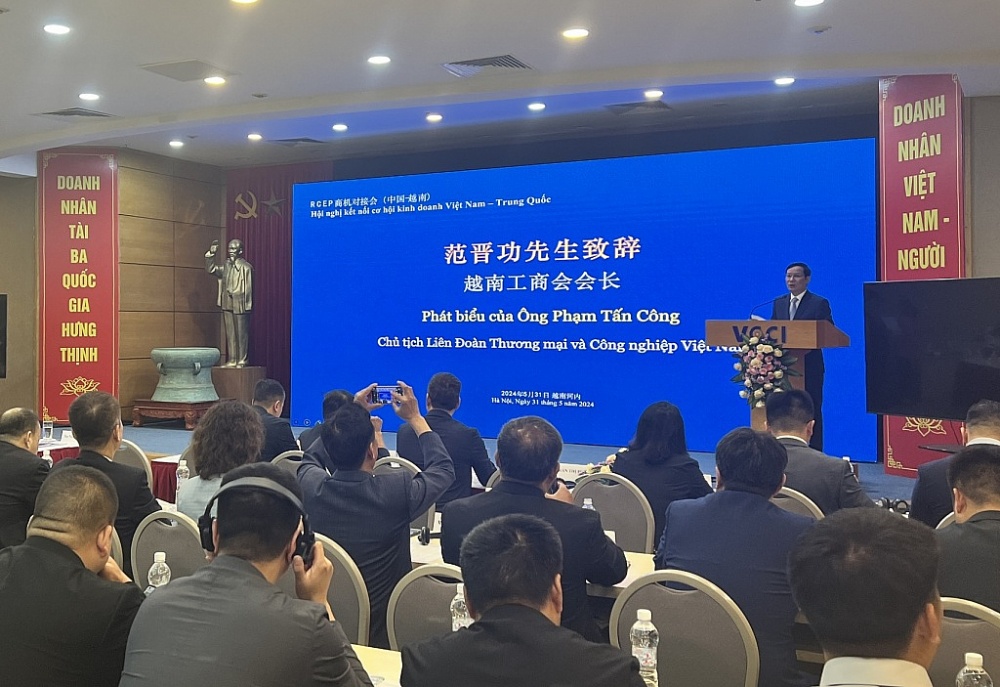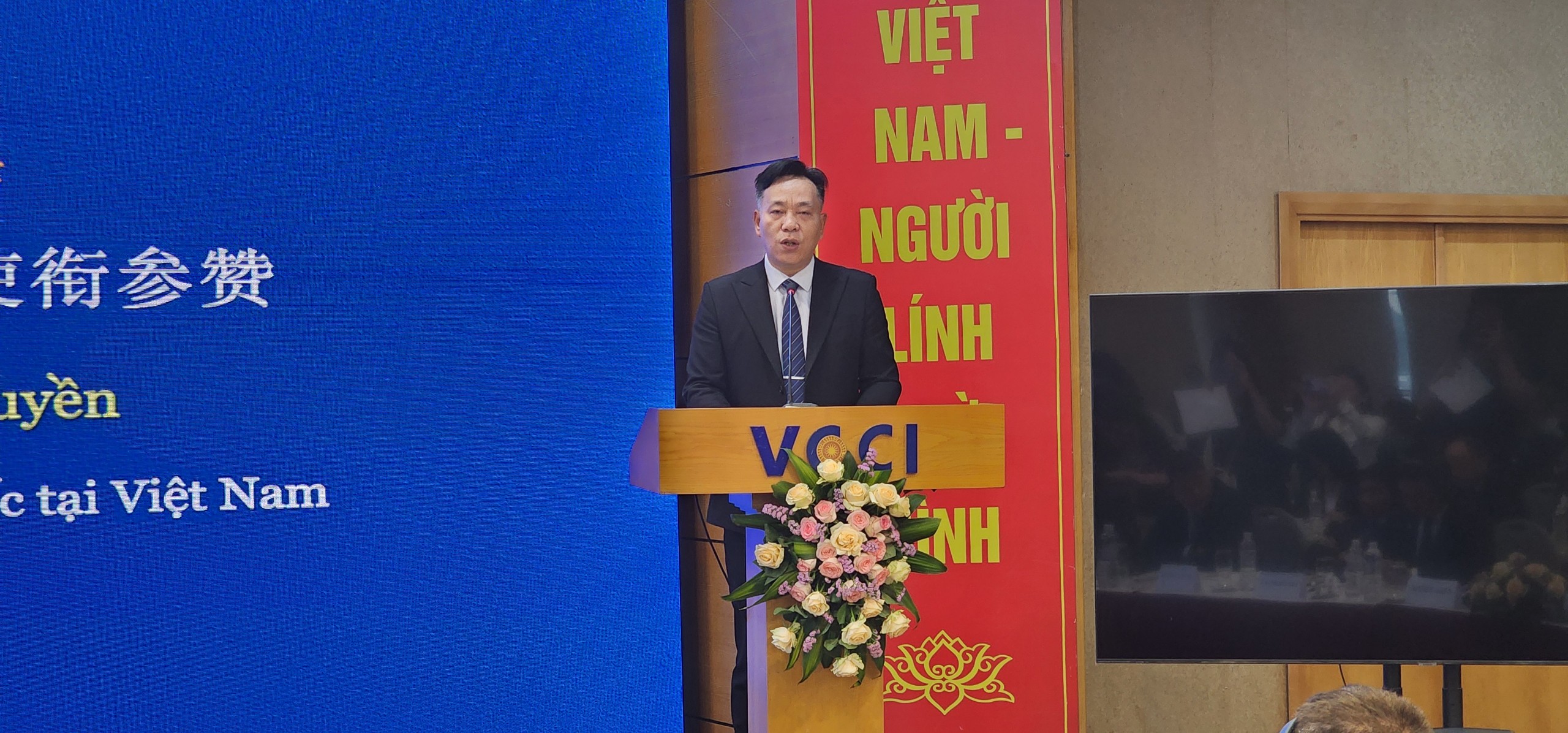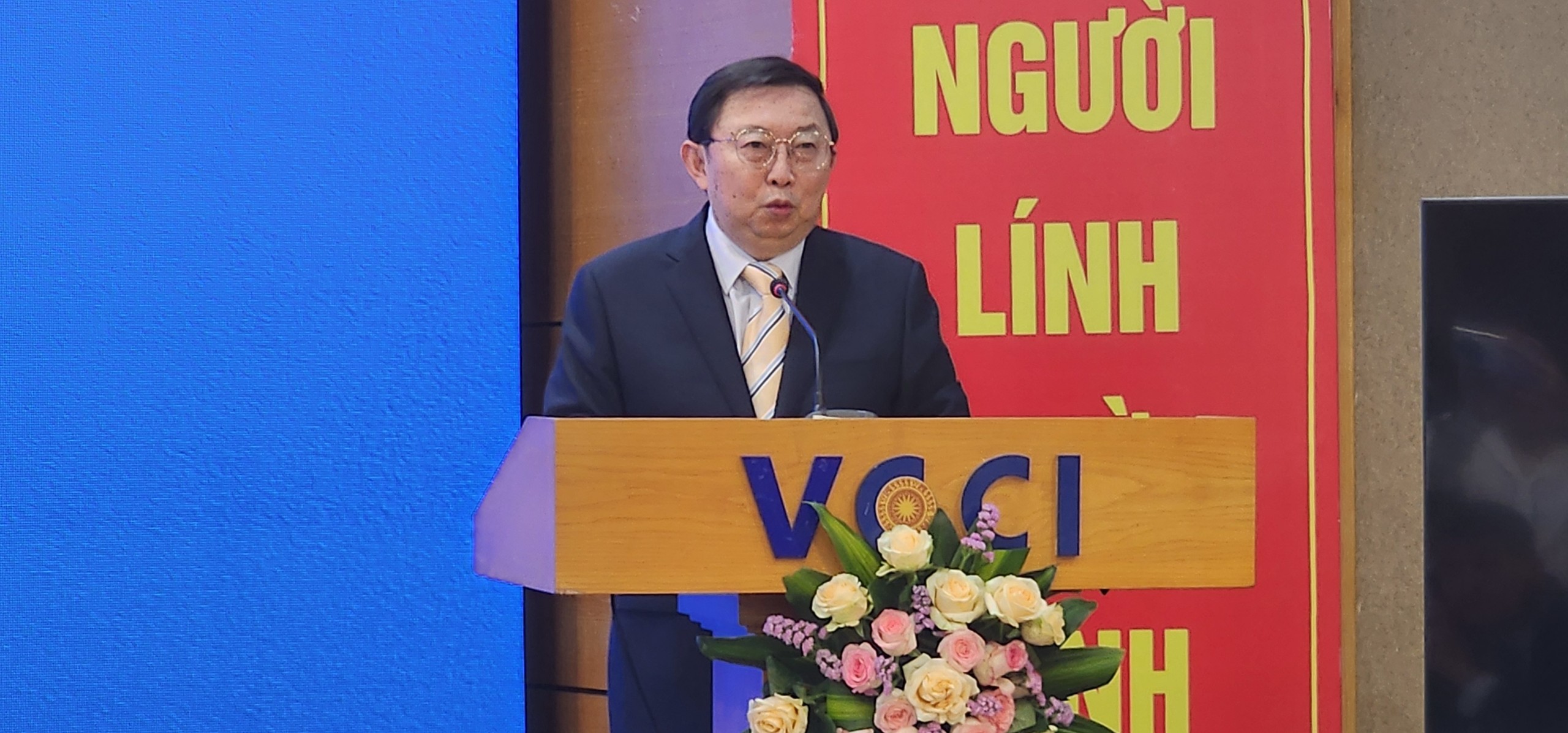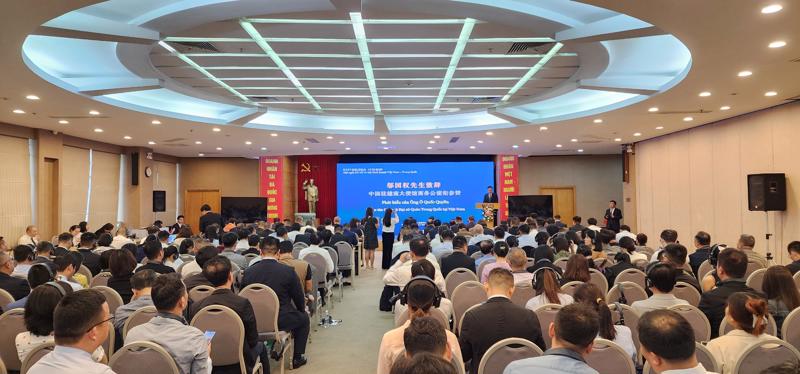With the theme “Promoting Business Cooperation between Vietnam and China”, a business opportunity connection conference on May 31 in Hanoi attracted the participation of a visiting Chinese delegation of 150 CEOs and representatives from businesses, associations, and localities in the country.
It provided an opportunity for all parties to review the achievements within the extensive economic cooperation between Vietnam and China over the years while also facilitating Chinese enterprises seeking cooperative opportunities with Vietnamese partners.
Addressing the conference, Mr. Pham Tan Cong, Chairman of the Vietnam Chamber of Commerce and Industry (VCCI), which organized the gathering, praised the long-term and successful cooperation between the two countries in a host of fields, with economic cooperation being a crucial driving force.
2023 a breakthrough year in investment cooperation
Economic, trade, and investment cooperation between the two countries has continuously deepened and recently become a highlight of bilateral relations, Mr. Cong continued.
Trade between the two neighbors has increased more than four-fold over the past decade, with China becoming Vietnam’s largest import market and Vietnam becoming China’s largest trading partner in the ASEAN bloc.
Bilateral trade turnover in 2023 stood at nearly $172 billion. In the opening four months of this year, it reached $59.6 billion, with exports to China totaling $18 billion and imports from the country amounting to $41.6 billion.
Chinese investment, meanwhile, increased more than seven-fold over the past decade, making it the sixth-largest investor of Vietnam’s 146 investment partners. Investment cooperation saw a breakthrough last year, with China rising to become Vietnam’s leading partner in new investment projects.

“As of March this year, China had 4,418 active projects in Vietnam with total registered capital of over $27.6 billion,” Mr. Cong told the conference.
Similarly, Mr. Wu Guoquan, Minister Counselor at the Chinese Embassy in Vietnam, affirmed that China and Vietnam are important economic and trade partners, with cooperation in these regards being significant components of their comprehensive strategic partnership.
“In the first four months of this year, bilateral trade turnover reached $80.31 billion, an increase of more than 20 per cent,” he went on. “Chinese enterprises carried out 278 new investment projects in Vietnam during the period, ranking China first among the 145 countries and territories investing in Vietnam.”
Space for cooperation to grow
Vietnam aims to join the group of developed, high-income countries by 2045. The Vietnamese Government is determined to reach this goal and has adopted strategies for developing a green economy and a circular economy and conducting digital transformation. These represent major opportunities for Chinese enterprises to succeed in the country.
Mr. Cong emphasized that in the context of the global economy facing headwinds and fluctuations, strengthening business cooperation between Vietnam and China has become even more critical.
“China, with a market of over 1.4 billion people, diverse demand for goods, a developed logistics network, and strong growth in e-commerce, promises increasing prospects for economic and trade cooperation between the two sides,” the VCCI Chairman said.
Businesses from both countries not only need to quickly adapt to changes but also seize opportunities to expand markets, develop new products and services, and seek innovative solutions to enhance competitiveness.

Mr. Cong expressed a belief that the Regional Comprehensive Economic Partnership (RCEP), a next-generation free trade agreement with the largest scale in the world, will become a new driving force for the economies and businesses of both countries.
According to Mr. Wu, the RCEP, after being in effect for more than two years, has proven effective in reducing regional trade costs, tightening supply chain links within the region, bringing practical benefits to participating countries, including China and Vietnam, and contributing to global economic recovery.
He hopes that business associations and enterprises from both sides will make good use of the high-quality platform provided by the RCEP, exploit cooperative potential, expand industrial connectivity, deepen mutually-beneficial cooperation, and jointly promote the friendly cooperative relations between Vietnam and China to new heights.
In his remarks at the conference, Mr. Xu Ningning, Chairman of the RCEP Industrial Cooperation Committee, Chief ASEAN Business Expert in China, and head of the business delegation visiting Vietnam, assessed that Vietnam-China economic and trade cooperation boasts many advantages and favorable conditions.
Firstly, the leaders and governments of both countries have reached a series of cooperative agreements.
Secondly, economic and trade relations are complementary, with significant potential in industrial cooperation.
Thirdly, there is a solid foundation for enhancing cooperation. China is Vietnam’s largest trading partner, and Vietnam is an important trading partner of China.
Fourthly, convenient transportation facilitates trade and investment cooperation between enterprises.
And lastly, enterprises from both sides have actively cooperated in developing international markets.
“The visit by the Chinese business delegation, with hundreds of members, and this conference aim to leverage these advantages and favorable conditions and further encourage enterprises and stakeholders in both countries to exploit the complementarity in economics and trade, thereby enhancing understanding and cooperation for mutual development,” Mr. Xu affirmed.
Proposals to enhance efficiency in economic cooperation
In addition to his positive assessment of the cooperative achievements between Vietnam and China, Mr. Xu also made several proposals to deepen the relationship further, enhance the efficiency of economic connectivity, and create more favorable conditions for businesses in the two countries.

Firstly, effectively implement common understandings on economic cooperation reached by the leaders and governments of both countries. Stakeholders in cooperative endeavors should familiarize themselves with these understandings before conducting business.
Secondly, enhance the role of trade associations and industry associations in cooperation. Trade associations from both countries should actively link together, as cooperation between associations will yield outstanding results and effectively guide business cooperation.
Thirdly, businesses need to further improve their capabilities in international trade and investment cooperation, including leveraging multilateral and bilateral free trade agreements, exploring each other’s markets, and jointly developing third-party markets. They must also comply with the law, respect local customs, and continuously strengthen localized business practices.
Lastly, fully utilize the role of local governments in economic and trade cooperation between the two countries.
He added that China welcomes relevant Vietnamese authorities to organize delegations to visit its cities and provinces to explore business opportunities, negotiate cooperative deals, attract investment, and explore markets.









 Google translate
Google translate